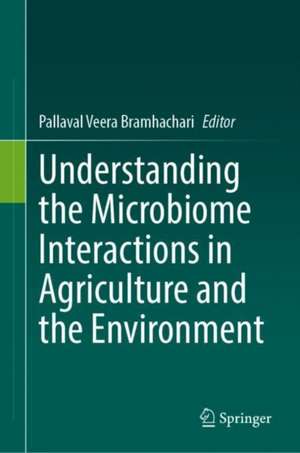Understanding the Microbiome Interactions in Agriculture and the Environment
Editat de Pallaval Veera Bramhacharien Limba Engleză Hardback – 26 iul 2022
| Toate formatele și edițiile | Preț | Express |
|---|---|---|
| Paperback (1) | 1385.23 lei 43-57 zile | |
| Springer Nature Singapore – 26 iul 2023 | 1385.23 lei 43-57 zile | |
| Hardback (1) | 1390.59 lei 43-57 zile | |
| Springer Nature Singapore – 26 iul 2022 | 1390.59 lei 43-57 zile |
Preț: 1390.59 lei
Preț vechi: 1695.83 lei
-18% Nou
Puncte Express: 2086
Preț estimativ în valută:
266.08€ • 278.56$ • 220.17£
266.08€ • 278.56$ • 220.17£
Carte tipărită la comandă
Livrare economică 07-21 aprilie
Preluare comenzi: 021 569.72.76
Specificații
ISBN-13: 9789811936951
ISBN-10: 9811936951
Pagini: 344
Ilustrații: XXIII, 344 p. 1 illus.
Dimensiuni: 155 x 235 mm
Greutate: 0.72 kg
Ediția:1st ed. 2022
Editura: Springer Nature Singapore
Colecția Springer
Locul publicării:Singapore, Singapore
ISBN-10: 9811936951
Pagini: 344
Ilustrații: XXIII, 344 p. 1 illus.
Dimensiuni: 155 x 235 mm
Greutate: 0.72 kg
Ediția:1st ed. 2022
Editura: Springer Nature Singapore
Colecția Springer
Locul publicării:Singapore, Singapore
Cuprins
Unravelling the microbiome interactions in the environment and agriculture in the era of metagenomics.- Antimicrobial Resistance in Environmental Microbiome: an overview.- Mechanistic adaptation of microbiomes in extreme environments.- Mangrove microbiomes: Biodiversity, ecological significance, and potential role in the amelioration of metal stress.- Dynamics of the coral microbiome and its link to Climate Change.- A paradigm shift in the role of the microbiomes in environmental health and agriculture sustainability.- Modifications in Environmental Microbiome and the Evolution of Viruses through Genetic Diversity.- Novel Insights into Environmental Niche Adaptations and Secondary Metabolite Biosynthesis Potential of marine sponge microbiome.- Microbiome-based Sustainable Agriculture Targeting Plant Protection.- Rhizobacteriome: Plant Growth-Promoting Traits and its Functional Mechanism in Plant Growth, Development, and Defenses.- The Cellulosome: A fiber degrading strategist of the rumen microbiome.- Metagenomic approaches for studying plant-microbe interactions.- Nitty-gritty into the plant microbiomes: Understanding Microbial niche associations and dynamics in various plant parts.- A conceptual framework to explore the functional implications of Coral-associated microbiomes and their role in promoting plant growth.- Soil microbiome- characteristics, the impact of climate change, and resilience.- Endophytic microbiomes and their role in drought stress tolerance in plants.
Notă biografică
Dr. Pallaval Veera Bramhachari is currently a Head & Senior Faculty member of the Department of Biotechnology at Krishna University, Machilipatnam, India. He has earlier served as a Postdoctoral research scientist at the Bacterial Pathogenesis Laboratory, Queensland Institute of Medical Research (QIMR-Berghofoer Research Center),), Brisbane, Australia, and a DBT Postdoctoral fellow at the Department of Microbiology and Cell Biology, Indian Institute of Science (IISc), Bangalore. He completed his Ph.D. in Microbiology from Goa University, India. His major research interests are the investigation of the applied research in microbiology and cell biology including the biochemical mechanism of bacterial-biofilm formations, extracellular microbial polysaccharides, and the structure-function relationship of bacterial biosurfactants (glycolipids and rhamnolipids), pathogenic and virulence characteristics of bacteria, basic and translational cancer research. He has published more than 140 research articles in Scopus-indexed journals, authored and co-authored 7 international books and invited book chapters in prestigious peer-reviewed international and presented 50 abstracts at various national and international conferences. He has served as an editorial board and reviewer for several national and international journals. He is a member of numerous international scientific societies and organizations, most importantly, the Indian Science Congress & Society of Biological Chemists, India. He completed two major research projects from SERB, DST NRDMS, Govt of India.
He was awarded a Travel Scholarship from QIMR-2007, Australia for attending the 4th Indo-Australian Biotechnology Conference in Brisbane, Australia, Awarded with a young scientist travel fellowship (2007) from the DST, Govt. of India for attending XVII Lancefield International Symposium at Porto Heli–Greece-2008, He was conferred with various prestigious awards, notably, Science Education Research Board (SERB), Government of India-Young Scientist award (2011) with a research project and Nominated as Associate Fellow of Andhra Pradesh Academy of Sciences (APAS)-2016, MASTER TRAINER: Andhra Pradesh English Communications Skills Project. British Council & APSCHE 2017, Andhra Pradesh State Best Scientist award-2017, Dr. V. Ramalingaswamy Memorial award for Biomedical Sciences-2019. He also obtained two Indian patents in 2017. He has more than 13 years of teaching and research experience at the university level.
Textul de pe ultima copertă
This book illustrates the importance of microbiome interactions in sustainable agriculture and the environment. The chapters of the book provide information pertaining to the vast diversity of microbiomes in many ecosystems and their functional dynamics. The book also discusses bioremediation, space microbiomes, geo microbiomes, coral microbiomes, antibiotic resistomes, and rhizomicrobiome. It also sheds light on the complex syntrophic and other symbiotic interactions between bacteria, protists, plants, and certain animals in agricultural and environmental systems. The book, in turn, provides an understanding of the adaptation, resilience, and evolution of microbial ecosystems. Further, the chapters cover metagenomics analysis of microbiomes of a novel or extreme environments, microbial resilience or temporal fluctuations, symbiosis and co-evolution of the microbiome, and novel microbial interactions in agriculture and environment. Finally, the book elucidates a comprehensive yet representative description of complex structural and functional diversity within the plant and environmental microbiomes to reveal their immense potential. This book covers United Nations Sustainable Developmental Goal 2 towards Zero Hunger.
Caracteristici
Covers topic related to the United Nations Sustainable Developmental Goal 2
Discusses the importance of microbiome interactions in agriculture and the environment
Explores adaptation, resilience, and evolution of microbial ecosystems
Discusses the importance of microbiome interactions in agriculture and the environment
Explores adaptation, resilience, and evolution of microbial ecosystems
